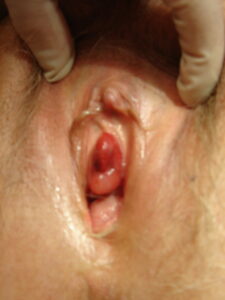In women, the so-called sexual pains generate confusion regarding their name and origin. They usually cause anguish both in the woman who suffers them and in her partner. It is a problem that remains hidden in many women by a feeling of shame.
Actually the sexual pains are vaginismus and dyspareunia that I will explain below, since they are intimately related to coital sexual relations. The vulvodynia is a chronic feeling of discomfort in the vulva not necessarily related to sexual contact. It can appear spontaneously, they usually describe the discomfort as a burning sensation, burning. There are no clear neurological lesions.
Vaginismo es la dificultad persistente o recurrente para introducir el pene, dedo o cualquier otro objeto por vagina a pesar de que mentalmente esa mujer lo desea y de que no existen anomalías físicas. Como dije al principio, no creo que la denominación de dolor sexual sea la adecuada. Evidentemente el intento de la penetración vaginal contra esa dificultad generaría dolor, pero el hecho por el que se produce esa “barrera” a la penetración no genera dolor en sí. Físicamente se produce una contracción o espasmo vaginal de la musculatura del tercio externo vaginal. También es clásica la actitud defensiva cruzando la piernas para “defenderse” de la penetración.
Sometimes patients comment that their problem is a narrow vagina and that something, such as an operation, would have to be done to widen it. Obviously this is a subjective assessment and in practically all cases there are no abnormalities of the vaginal anatomy.
Dyspareunia is persistent or recurrent pain associated with sexual intercourse, in both men and women. In women it can occur before, during or after penetration. In men, the most common is painful ejaculation. For many years, in women, it has received different names depending on the painful area: clitorodynia, vulvodynia, vulvar vestibulitis, hemivulvodynia. Today we identify them as superficial or deep and generalized or localized.
In view of these two definitions, we sometimes find ourselves with the difficult task of differentiating between one and the other, since, for example, sustained dyspareunia over time can trigger vaginismus. Repeated pain in relationships would trigger vaginal spasm. On the contrary, a mild vaginismus that does not totally prevent penetration could be labeled as dyspareunia. Another duality that generates problems at the time of diagnosis is whether the pain in sexual intercourse is a purely organic or psychological problem. Many times the limit is not clear and a dyspareunia of organic cause can trigger psychological disorders of sexuality such as a lack of desire or vaginismus.
In the diagnosis of these problems we must investigate possible physical causes such as infections, inflammations, vaginal atrophy, congenital anomalies, vascular alterations or sequelae of previous vaginal interventions or manipulations.
Physical injury to the vagina. Urethral caruncle

We explore the psychic disorders that can be associated with depression, anxiety, phobias, etc. History of sexual abuse, repressed sexuality for moral or cultural reasons are very decisive in the appearance of these problems. It is also important, if you have a partner, to know their opinion and feelings about this issue, as well as to investigate possible sexual problems in men . Erectile dysfunction or premature ejaculation could trigger the disorders in women, by blaming themselves for these male dysfunctions for not feeling desired, thinking that they do not know or cannot satisfy the man, even in some cases it is the man himself who blames the woman of your problems.
As I have mentioned, a large number of women who suffer from these problems do not consult a specialist . Some because they do not have regular sexual activity and it does not cause problems, others because they do not know which specialist to consult and others, despite having a partner, are only concerned at the time of considering motherhood or when problems begin to exist in living with their partner . It should be clarified that women with vaginismus do not have to have problems with arousal or desire . They can reach orgasm, they can enjoy caresses, contact with their partner, but always under the premise of non-penetration.
In my professional lifeI have seen couples in which the presence of vaginismus has led them to conceive children with assisted reproductive techniques, even several children. However, their life as a couple was totally satisfactory. Therefore, although it is true that in the vast majority of cases the presence of these sexual pains produces in women a loss of self-esteem, fear, a feeling of illness, sexual dissatisfaction, it is necessary to respect the sexual life options of these couples. If there are no such problems for the woman and there is no demand or concern about the sexual life of the male in the couple, we should not insist on acting or modifying their habits, only if there is a disagreement of feelings, sensations or desires between the members of the couple. even the performance of the professional is necessary.
In later posts we will comment a bit on how we can help these patients professionally .



